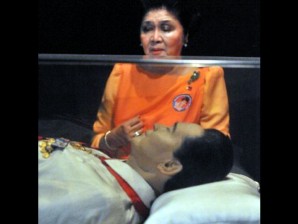Binay recommendation: Military honors for Marcos burial in Ilocos

BURIAL FOR A PRESIDENT. Philippines former first lady Imelda Marcos looks at the glass coffin of her late husband former president Ferdinand Marcos in Batac, Ilocos norte province north of Manila on March 26, 2010, prior to the start of her election campaign sortie in the province. Mrs. Marcos ran for Congress and won a seat in the May 10, 2010 elections. AFP FILE PHOTO
The same source, who asked not to be identified by name, declined to provide other details about Binay’s proposed burial arrangements for the late dictator.
Aquino had tasked Binay to decide whether to allow the burial of Marcos at the Libingan ng mga Bayani.
Being the son of the late President Corazon Aquino and assassinated former Senator Benigno Aquino Jr., both of who were among Marcos’ greatest political foes, the young Aquino inhibited himself from making a public stand, citing personal bias, and asked Binay to help him decide.
Marcos’ remains are preserved in a refrigerated crypt in Batac City, Ilocos Norte. His family has refused to bury him until he would be buried at the Libingan ng mga Bayani with full military honors.
Marcos died on Sept 28, 1989 while in exile in Honolulu, Hawaii. His remains were brought back to Manila in 1993 during the administration of President Fidel Ramos, a distant relative of the ousted leader.
Article continues after this advertisementEarly this week, Binay said he was hopeful Aquino would announce “within the week” the government’s decision on the late strongman’s burial.
Article continues after this advertisementHe described his recommendations as “very balanced,” claiming that “all sides were considered.”
Binay said that “every opinion from every person who responded to the survey [conducted by the Office of the Vice President] was given consideration.”
In April, Binay’s office sent out an undisclosed number of letters seeking the opinion of various groups and decision-makers on the Marcos burial issue. It also launched a text and e-mail survey to encourage public participation on the matter.
Last month, Binay disclosed that “senators and lawmakers [had] not sent their official responses to the survey conducted by the OVP, although some [had] already expressed their opinion through the media.”
He also said that “none of the 130 parties accredited by the Commission on Elections [had] so far replied to the OVP’s letter seeking their official stand on the issue.” But his office said it would “still wait for the official stand of the political parties.”
At the House of Representatives, a resolution was filed by Sorsogon Representative Salvador Escudero urging Malacañang to allow the burial of the remains of the late strongman at the Libingan ng mga Bayani. At least 216 House members signed House Resolution No. 1135.
The resolution said that “as the longest serving President of the republic, Ferdinand Marcos built the modern foundations of the Philippines” and that Marcos “remained a Filipino patriot to the end of his life and in death deserves to be honored as such.”
The Makati Business Club (MBC), however, dismissed the House measure as “historical revisionism at its deceitful worst in an attempt to recast the image of a disgraced leader.”
In a statement, the MBC said “the claim that he built the modern foundations of the Philippines is a gross distortion of the late dictator’s true legacy of autocracy, ruined democratic institutions, violent political repression, unprecedented wholesale corruption, shameless nepotisms, crony capitalism, a crushing debt burden, and widespread social inequity and marginalization.”
It recalled that Marcos “did not call for a presidential election until 1981 – a sham political exercise meant to bolster his democratic pretensions.”
“It was only due to the intense political pressure that had built up after the assassination of Senator Benigno Aquino Jr. in 1983 that he was forced to call another presidential election in 1986. He tried to steal that vote as well, but the true will of the people could no longer be suppressed and he was driven out of power by a peaceful popular uprising,” the MBC added.